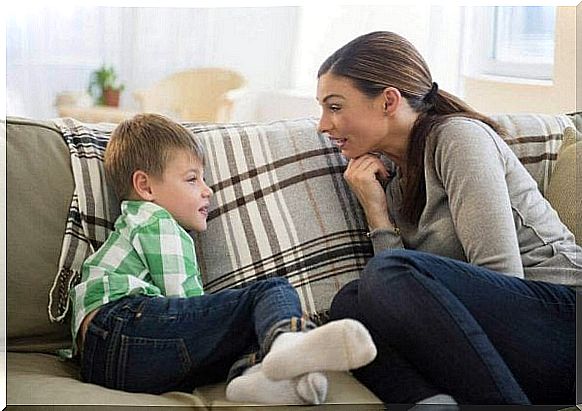6 Tips To Improve Communication Between Parents And Children

There is no parenting guide that will work for every parent in the world. But there are certain general guidelines that can serve as your trusted compass if you want to have a good relationship with your children. These guidelines can also help you talk to them about sensitive topics. Good communication between parents and children is of the utmost importance.
In this article we give you tips for better communication and more empathy. We give you advice on how to actively listen to your children and how they can talk to you.
Don’t try to impose anything, talk to your kids!
When communicating with your kids, it’s best to avoid narrow-minded “because I say so” comments. This is especially true when your kids are not so little anymore. Talk to them, ask questions, encourage shared reflection.
Listen to the reasons why they did what they did and try to reach an agreement that you both agree on. It is true that this takes more effort, but these agreements will be fulfilled much sooner.
As parents, we want to control every situation our children experience. At home, with their siblings, their friends, grandparents, at school, etc. If we just tell them what to do, even if the damage has already been done, they will obey and will be protected if such a thing ever happens again. happens to them, we think.
However, the best way to help your children with conflict is to help them reflect and try to understand the reasons why they behaved this way. This will also promote the relationship between you, as they will feel like they are being listened to and taken into account.

Communication between parents and children: talk to them about your own experiences
Communication between parents and children must be two-way and adapted to the age of the children. It can be very helpful to tell them about your own experiences. Tell them about how you feel and what you think. This makes you more human and will break down that wall that you sometimes erect to seem invincible.
With this way of communicating, your children will feel more connected to you and learn new ways to solve problems. That doesn’t necessarily mean they will act the same as you, but it will pave the way for more openness and trust on their part. They will be able to trust you to tell you what is happening in their lives.
Listen actively and never judge
Active listening means being empathetic and caring about the feelings behind the story being told. It means that sometimes you have to put in more effort to break down walls, especially those of uncertainty or indecision. That’s why it’s important not to use anything they’ve ever told you in confidence against them. No matter how angry you are at that moment.
Parenting is a challenge. It involves adopting an open-minded mind that understands that children look at the world in a different way. A perspective that deserves just as much respect as yours. You will have to recognize your child as an equal. And as they get older even as a superior in certain discussions.
By not judging them, you are clearly communicating to them that you want to listen, that you are willing to accept them. You are willing to accept that they are sad, angry or hurt. When you acknowledge their emotions, you can help them make decisions.

Parents first, friends second
It is important to be open when you talk to your children. You want to know what they want, what their interests are… But remember that your children need a parent to guide them and set boundaries; not one who is their friend. That is not your role, or at least not your most important role.
As your kids grow up and become teens, there will be topics they don’t want to discuss with you. It is important that you respect this and that you have patience for this. They may not want to talk about it right now, but if you keep the door open, they might just walk in on you at some point.
And if you guard the communication between the two of you and develop a close bond with your children, there will be few things they don’t want to share with you. Eventually they will come to you with their problems. But, as we said, that will only happen if you respect their privacy and independence (if they are old enough, of course). If you don’t, they will distance themselves from you to protect their rights.
Be the good example
Communication between parents and children should be direct and clear. If your children see you talking about them to other people, or that you are talking to others about your family or other personal topics, they are likely to withdraw. They will be afraid that you will share their secrets.
Another foundation for good communication is sincerity. It’s important to always try to be honest about what you think, say, and feel. This also means that you keep the promises and commitments you make.
If you’re sincere, your kids will probably come to you even if they know you won’t like what they have to say. They will do something wonderful: they will trust that you have the solutions to their problems.
Being honest also means being able to ask for forgiveness and admit your own mistakes. Your children will behave the way they see you behave. You are their role model. If you don’t act with honesty and integrity, chances are they won’t either.
Don’t argue with your kids about ‘who’s right’
Conversations often turn into discussions and arguments. It’s important to avoid this by keeping your cool and acting like the adult you are. Use an appropriate tone and listen to what they have to say first, don’t interrupt them.
Each of you should have your say. Then you try to reach an agreement. Often you will disagree with your children or they will disagree with you. But each of you must be able to express yourself without feeling belittled.
You’re the adult, that’s true, but that doesn’t mean your kids don’t have an opinion of their own. Nor does it mean that they do not have their own reasons for acting as they do. Talking to them without trying to impose your own ideas is therefore the best way to promote good communication. You also make sure that they feel valued and heard.

Latest tips to improve communication between parents and children
Here are some final recommendations on parent-child communication. Work on this and pave the way for a way of communicating based on trust.
- Ask them what they need when they want to talk to you. Do they want advice or help solving a problem? Or do they just want you to listen to them?
- Keep it positive and don’t make it too personal. For example, say “I don’t like what you did” or “Maybe you could have done it differently” instead of “You’re wrong.”
- Let them make mistakes. You won’t be able to prevent them from making mistakes, and often those experiences will teach them something.
- Be clear when giving information. Be consistent and don’t contradict yourself. This way they will know clearly what you are asking of them and there will be no confusion.
- Involve them in decision-making that affects the family.
Communication is the foundation of any relationship. Indirectly, it is a determining factor in fundamental values, values such as trust and sincerity. That is precisely why we say that communication between parents and children is worth some time and some thought.









